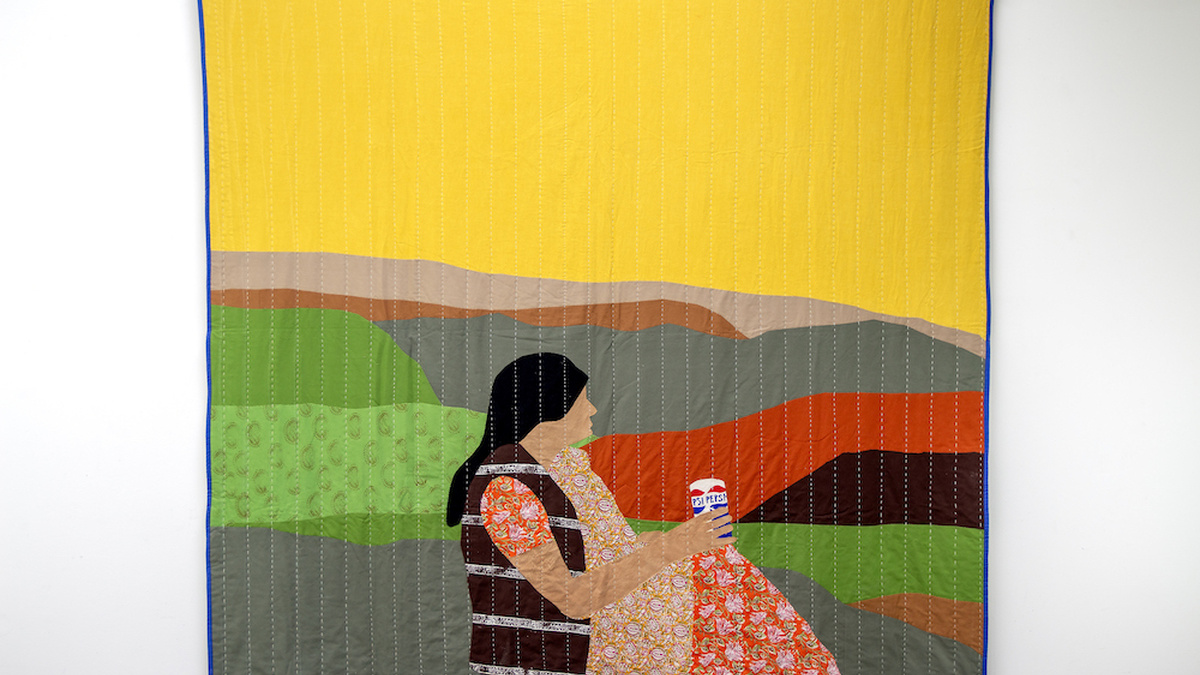Jalsaghar: ‘Present’-ing the Future / Recognizing the Past
“We Are Here Because You Were There”
Tue 15 October 2024

Wheelchair accessible

Debjani Banerjee, That floats on high o'er vales and hills, 2023. Image credit Oana Stanciu.
The title of Session 2 quotes A. Sivanandan, who was the director of the Institute of Race Relations from 1973-2013, and editor of the journal ‘Race and Class’. We will explore Britain’s colonial past in relation to twentieth century migrations to the UK, and consider the role of class in shaping social dynamics of the time. Topics will include colonial roots of Asian and Caribbean presence in the UK, forgotten policies that have shaped our landscape, race relations legislation, and amnesia in popular culture. The session aims to provide context and to challenge distorted arguments being further popularised today.
Workshop: Poetry in Motion, devising chants and rhymes for anti-fascist marches
With India Boxall
As we saw in the aftermath to the July 2024 UK anti-immigration riots, in which a far-right presence was visible both physically and online, a clearly stated ant-fascist citizens’ response was crucial. The anti-fascist rallies that effectively prevented further riots in England, and recently in Glasgow, demonstrated that not all had been taken in by misinformation. Not all were willing to scapegoat refugees, asylum seekers and immigrants for growing social deprivation in the UK. In this workshop we consider whether we can creatively address this issue with words that unequivocally reject racist / xenophobic/ or other exclusionist ideologies but also inject information, persuasion and compassion into the chants. Can a sound bite or critical aphorism such as Sivanandan’s reach the ones that might still have the capacity to change?
‘Present’-ing the Future / Recognizing the Past
A four-part immersion into historical and cultural themes in Debjani Banerjee’s Jalsaghar by Dr. Ranjana Thapalyal and guests
The references in Jalsaghar are rich and varied, encompassing the classics of ancient Indian literature, their presence in pop culture, and the politics of migration rooted in Britain’s colonial history. Most vividly, Jalsaghar brings before us the vibrant characters of the Mahabharata, India’s c. second-century BCE epic, a complex and intricately woven tale that has been told, retold, and passionately discussed through the ages. Contemporary interpretations and critiques abound, both in everyday conversations and academic studies. Banerjee’s selection of characters from the Mahabharata float alongside snippets of recent British political history, with its long reach back to colonial-era decisions. These characters also resonate with themes of migration and personal diasporic experience, of belonging, and the transgressions required to assert hybrid cultural identities. This series of workshops and talks delves into these subjects with the aim of critically contextualising them, exploring connections to contemporary questions about community, human relations, spirituality, and art’s role in reflecting on all of this.
There will be four sessions of 2 hours, each consisting of a talk and a practical workshop. We suggest you attend all four sessions to get a more in-depth sense of the issues and ideas we will touch on, but if this is not possible, you are welcome to attend a selection.
About the artists and workshop facilitators
Dr. Ranjana Thapalyal
Dr. Ranjana Thapalyal is
an Indian born inter-disciplinary artist and academic, based in
Glasgow, Scotland. Her practice spans ceramics, painting, collaborative
performance, creative and critical writing. Research has played a
significant role in her work, focussed on the nature of materials
themselves in the early work, to broader philosophical concerns leading
to written publications and collaborations. Of particular interest are
concepts of ‘self’ in South Asian and West African traditions, feminist
readings of ancient philosophies of the South, cultural politics and the
development of decolonising, anti-racist strategies for art pedagogy.
India Boxall
India is a creative researcher and facilitator whose work explores transdisciplinary practices and diffractive pedagogies. Her interests lie in subverting conventional notions of theory, matter, and language, viewing knowledge creation as an active, kaleidoscopic practice for the multifaceted self. This practice spans drawings, textiles, sculpture, text, and digital media, often incorporating unconventional materials. She is a co-conspirator of MUCK (Must Use Critical Knowledge), an online archive dedicated to critical art writing and visual practices.
Rudy Kanhye
Rudy Kanhye is a disabled artist and researcher from the global majority working between Mauritius, France and Scotland. His research interests include archives, memories, oral histories, extending this focus through Mauritius Island, the Global South and its neo-colonial relationship to the West. Born in Dijon, France and a descendent of Mauritian Indian indentured immigrants, he experiments with collaborative, interactive artworks which re-imagine archival research at the intersections between race, disability and the environment and the collective memories of migrant communities.
His recent focus has been on uncovering the hidden history of the labour system and the involvement of the British Empire and Scotland, to create a framework for increasing diversity, including interpretation of the legacy of the post-slavery system of indentured labour.
Shalmali Shetty
Shalmali Shetty is an independent curator, writer and artist working between the UK and India. Her research interests include themes of archives, memories and material culture studies. She intends to coalesce her backgrounds in art practice and theory in the production of the curatorial. She is the recipient of the Visual Arts and Craft Makers Award, Glasgow (2022); the Skinny Magazine x Edinburgh Art Festival Emerging Writers, Edinburgh (2023), and the Art South Asia Project x Serendipity Arts Foundation Curatorial Research Fellowship, UK and India (2023).
Kapil Seshasayee
Kapil Seshasayee is a British Tamil artist fusing r&b, south indian classical and experimental rock music.